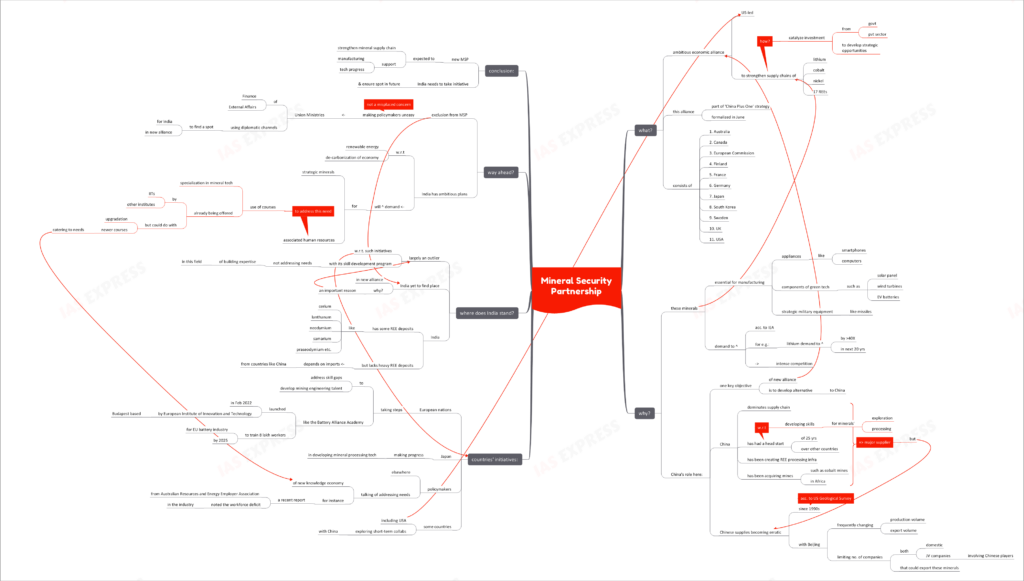Mineral Security Partnership

What is the Mineral Security Partnership?
- The Mineral Security Partnership or MSP is an ambitious new economic alliance formed as a part of the ‘China Plus One’ Strategy.
- This US-led partnership was formalized in June.
- It seeks to strengthen the member countries’ supply chains of lithium, cobalt, nickel and 17 rare earth minerals.
- It is to catalyse government and private investment to develop strategic opportunities.
- This group consists of 11 members, namely:

Why is a partnership being formed for minerals?
- These minerals are essential for manufacturing many modern-day, day-to-day appliances like smartphones and computers.
- They are vital for green technologies like wind turbines, solar panels and electric vehicles’ batteries.
- They also find use in strategic military equipment like missiles.
- According to the International Energy Agency, demand for some minerals (like lithium) could increase over 40 times in the next 20 years. This paves way for an intense competition over mineral sources.
How does China figure in here?
- One of the key objectives of the new alliance is to develop alternatives to China.
- China, not only dominates these minerals’ supply chains, but has had a head-start of some 25 years over other countries when it comes to developing the skills for these minerals’ exploration and processing.
- It has been creating rare earth mineral processing infrastructure and has even been acquiring Cobalt mines in Africa.
- However, Chinese supply of these critical minerals haven’t been steady. The supply had started becoming erratic since 1990s, according to the US Geological Survey.
- Beijing keeps changing the production and export volumes. It also started to limit the number of companies (both domestic ones and joint venture ones) that could export such minerals.
What are the various countries doing?
- European nations have been taking steps to address the skill gaps and developing mining engineering talent.
- In February this year, the European Institute of Innovation and Technology, headquartered in Budapest, launched the Battery Alliance Academy. This is to train some 8 lakh workers for the EU battery industry by 2025.
- Japan has been making progress in developing mineral processing technologies.
- Elsewhere too, policymakers are talking of addressing the needs of the new knowledge economy. For instance, the Australian Resources and Energy Employer Association brought out a report highlighting workforce deficit in the industry.
- Some countries, including the USA, are exploring short-term collaborations with China.
Where does India stand?
- India has largely remained an outlier when it comes to such initiatives.
- The Indian skill development program doesn’t have components for building expertise in this field.
- The country is yet to find a place in the new alliance. Industry experts believe that the exclusion could be attributed to India’s lack of initiative in this field.
- While India has some REE deposits, such as those of cerium, lanthanum, neodymium, samarium, praseodymium, etc., many of the heavy REEs are not available in economically extractable quantities.
- As a result, India depends on imports from countries like China.
What is the way ahead?
- The exclusion from MSP is making Indian policymakers uneasy- a concern that isn’t misplaced. The Union Finance Ministry and the Union External Affairs Ministry are using diplomatic channels to find a place for India in the alliance.
- India has ambitious plans with regards to renewable energy and de-carbonization of the economy. This will increase the demand for these minerals and associated human resources.
- While IITs and other institutes offer specialization in mineral technologies, these courses could benefit from upgradation. New courses could be initiated to cater to the needs of the new knowledge economy.
Conclusion:
The new MSP is expected to strengthen the countries’ mineral supply chain and consequently support manufacturing and technological progress. Meanwhile, India needs to take initiative in the field and ensure its spot in the future.
Practice Question for Mains:
What is the Mineral Security Partnership? Why hasn’t India found a place in this critical new alliance? (250 words)
If you like this post, please share your feedback in the comments section below so that we will upload more posts like this.

